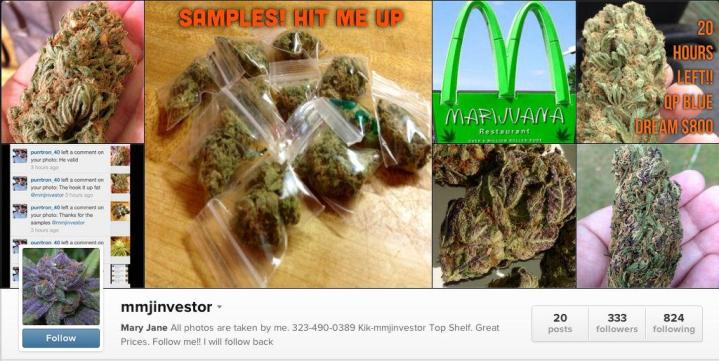
But real life is not always like the movies, and for every drug kingpin there are thousands of small-time hustlers charmed by easy cash and not inclined to think of the consequences of their actions. So it’s not surprising that people are trying to sell drugs on their Facebook and Instagram accounts, ignoring how easily their conversations and wheelings and dealings can be traced on these platforms.
In Bemidji, Minnesota, someone advertised 12 jars of marijuana for sale by posting about it on a popular local Facebook page called the “Bemidji Area Online Sale.” The Bemidji Pioneer reported that the posting garnered over 200 comments, including some pointing out how stupid it is to leave such a robust electronic trail. The post has since been deleted, but not before it drew attention to its creator.
The police went searching for the dealer, a person with the Facebook name Darrin Michael Thompson (Darrin Fuller), who said he’d be in a local parking lot. They never found Thompson, and since this is a relatively minor offense, they may not follow up – but if he continues to peddle marijuana 0r other drugs online, more tenacious police work will likely follow. This guy’s not getting off because it’s impossible to trace him, he’s getting off because it’s likely a low priority crime. But once a law enforcement official decides to make his dealings a priority, it won’t be hard to pin him down. Digital Trends reached out to Thompson to find out whether he’s concerned about getting arrested, but he did not respond.
Facebook isn’t the only social network where people are advertising drugs. The recently explored “junkie culture” on Instagram has taken root, and there are many accounts dedicated to depicting heroin and drug use; there are thousands of pictures tagged #nodsquad and #junkiesofIG. Some of the accounts focus on filtered shots of needles and other paraphernalia – they’re almost hypnotic in their seediness, and are nearly usable as promotional material warning kids of the dangers of shooting up, because they’re bleaker than a Bon Iver acoustic session. But other accounts go beyond showcasing drug use and blatantly sell the drugs they depict.
There are 271 photos tagged #weedforsale, and that’s just the beginning – there’s also #dankforsale, #pillsforsale, and innumerable photos selling drugs that don’t have hashtags.
Instagram users who create accounts that repeatedly offer drugs for sale may be harder to track down if they choose a handle unrelated to their name, but it’s still very easy to link them to criminal behavior once law enforcement officials can connect them to their account. Which means users like @aceteam2300, who put up hundreds of photos of drugs for sale, are sitting ducks.
If you look at the comment section of that picture, several users inquire about buying the pills, and @aceteam2300 is more than happy to respond and oblige.
What makes this behavior especially baffling is that there are several more secure ways to sell drugs online. After all, if someone is really serious about moving illicit merchandise on the Internet, there are substantially less idiotic ways to do it. The Silk Road and other websites sare designed to help people sell goods that are illegal in their countries of residence employ measures to make it harder to find buyers and sellers. Those websites require use of the Tor network, which hides your IP address and makes it much harder to track you down when you’re doing shifty stuff online.
The basic lack of understanding on display here about how the Internet works either means a shocking amount of users don’t realize how easy they are to trace, or maybe more likely, that they don’t really care. Instagram nonchalance may be a private investigators new best friend.


